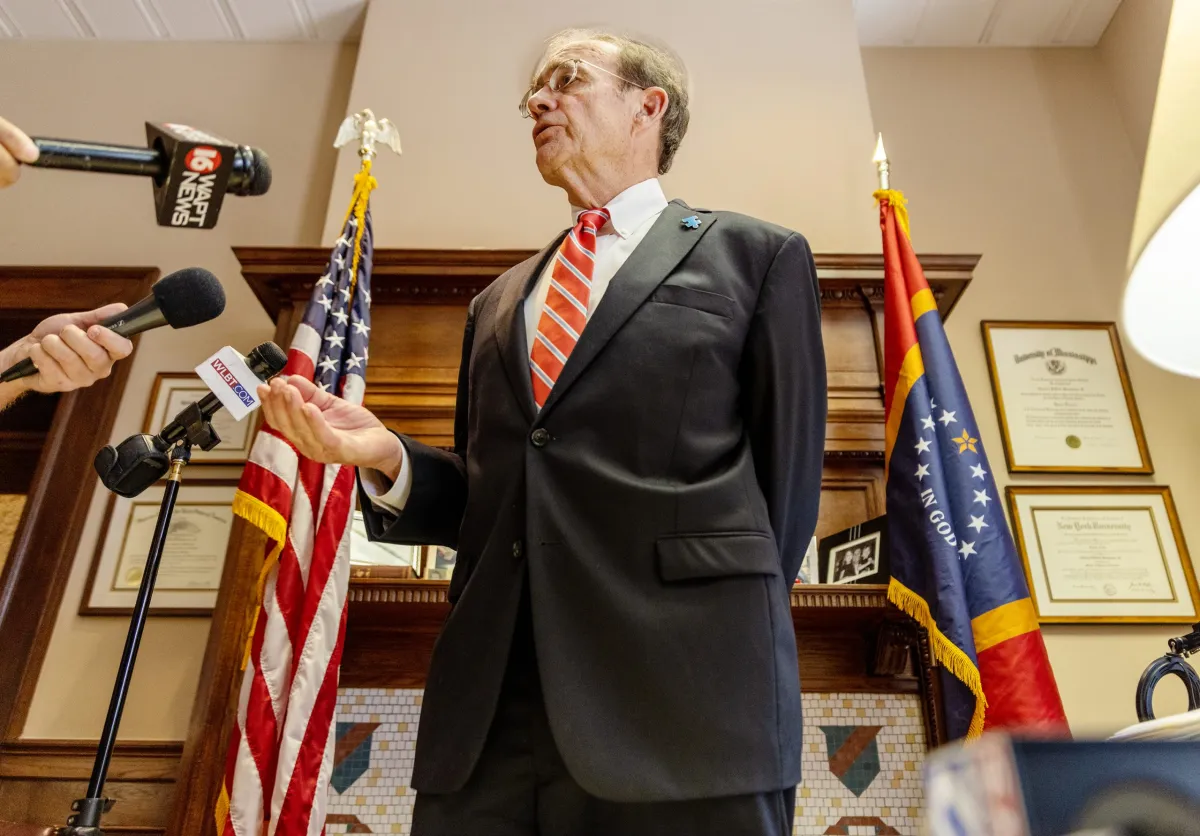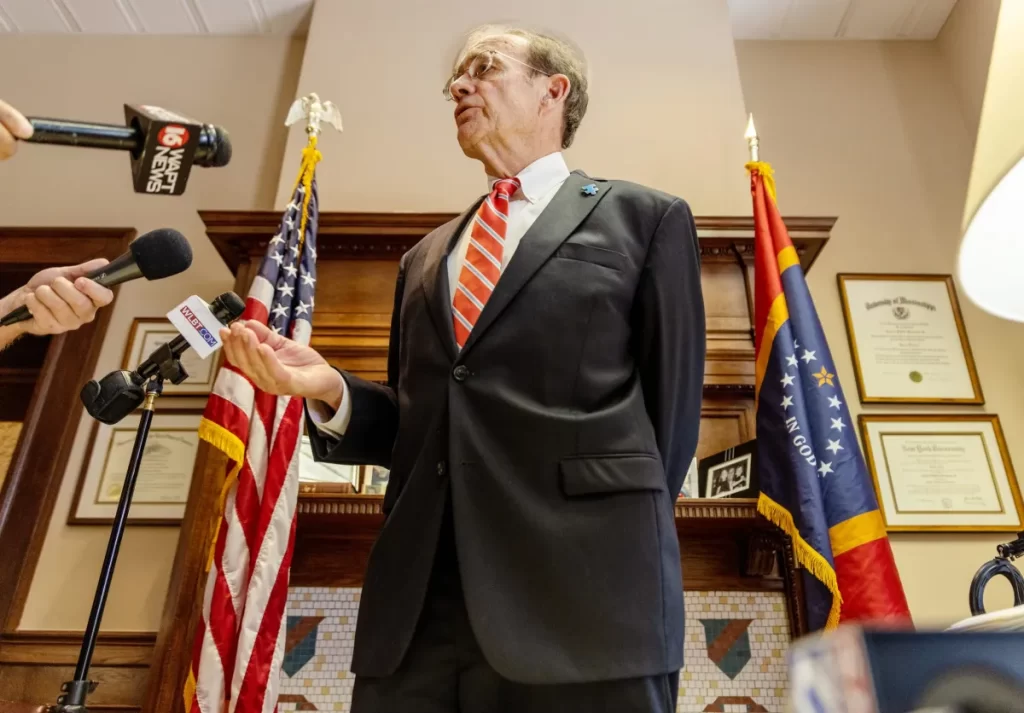Featured
STATE NEWS: State Leaders Meet to Discuss Solutions for Jackson Water Crisis

By Geoff Pender and Bobby Harrison
Mississippi Today

While local, state and federal officials scramble to restore the city of Jackson’s failed water system in the short-term, Mississippi state lawmakers and legislative leaders are meeting privately this week to discuss long-term solutions for the capital city’s collapsing system.
State officials knowledgeable of the deliberations agree that the immediate need is to restore an adequate flow to all parts of the city and end the need to boil water for drinking. But they also stress that much more is needed for a long-term fix for Jackson’s water system.
That fix will require legislation — both at the state level and perhaps on the federal level.
Members of Jackson’s legislative delegation met with Jackson Mayor Chokwe Antar Lumumba Wednesday afternoon and planned to meet with U.S. Rep. Bennie Thompson Wednesday night to discuss possible long-term solutions.
Thompson, who represents a large swath of the capital city, has vowed support of a workable plan to fix the water system. U.S. Rep. Michael Guest, who also represents a small portion of Jackson, said, “I am working in Congress to help find solutions and to put Jackson back on a pathway to being the capital city we need and deserve, but it is going to take a combined effort from leaders at all levels.”
Meanwhile, Lt. Gov. Delbert Hosemann, the only statewide Republican who owns a home inside the city of Jackson, has been meeting with Jackson lawmakers and other prominent state leaders since before the Jackson water system failed to brainstorm ideas for a permanent solution.
Various proposals have emerged in these talks over the past week, several people with direct knowledge of the deliberations told Mississippi Today. The ideas include:
- Creating a “regional water authority” to run the system, which also serves Byram and parts of Hinds County.
- Putting the city water system in a temporary conservatorship run by the state Public Service Commission, with the goal of passing the system back to city leaders after service has been restored.
- Creating some new state entity or commission to take full, permanent control of the city’s water system.
- Privatizing Jackson’s water system, leasing it to a private company that would manage it moving forward.
Hosemann said in an interview with Mississippi Today on Wednesday that he’s been “saddened and sickened” by the water crisis and watching it make national news. He said a long-term fix for Jackson’s water and sewerage will be an expensive, “monumental task.” But he vowed: “We will have a plan, and we will put Jackson back on its water feet.”
Hosemann said the task now at hand for a long-term solution is for state, federal, city of Jackson and Hinds County leaders to “first get a cogent plan.”
But getting this large group of politicians to agree on one single plan hasn’t been accomplished after many years of effort. Any of the options currently being discussed would require Jackson giving up at least some autonomy and control of its water operations.
As recently as 2021, city leaders including Lumumba have bristled at state attempts to ride herd over the city. These efforts include an attempted state takeover of Jackson’s regional airport, the state requiring a special board to oversee infrastructure work funded by a special 1-cent city sales tax, and recently lawmakers requiring state oversight of federal pandemic stimulus money for water and sewerage projects — requirements that were not placed on other cities.
Lumumba has described such state attitudes toward the capital city as “paternalistic” and “racist.” There has been an icy relationship between the majority Black, majority Democratic capital city and the white Republican state leadership that runs most of state government from Jackson.
But Hosemann said he doesn’t foresee such issues hindering teamwork on solving the water crisis. He noted Lumumba this week said he welcomes state assistance dealing with the issue. Both Hosemann and Gov. Tate Reeves, who is leading the state’s response to the short-term crisis, said they’ve met with the mayor and the city’s legislative delegation in recent days.
This would appear to be progress, although it’s notable that Lumumba and other city leaders have been absent at Reeves’ and state leaders’ recent press conferences on emergency water operations and vice versa.
Lumumba addressed this in a press conference on Wednesday afternoon.
“I’ve heard people say we’re having dueling press conferences,” Lumumba said. “That is not how I would characterize it.” He said he and Reeves are both trying to address the public “early and often” and are “leaning forward.” He said there is a “cooperative effort.”
A prevailing question about a state-sanctioned, long-term fix of the water system is whether the governor will call a special session soon or wait for the regular session in 2023 to address the water crisis.
Reeves recently said his primary focus is solving the immediate problem and that at some point legislators “would be able to weigh in a potential … long-term solution.” He said he had pledged to work with them on that solution.
Sen. John Horhn, a Democrat from Jackson, said waiting to the regular session “would give us time to come up with a strategy to determine what kind of system it will be (moving forward) and who will own it.”
Horhn said, “If state officials are going to provide a significant portion of the resources, we are going to want a say” in the operation of the system.
The mayor has estimated that solution would cost more than $1 billion.
Rep. Earle Banks, a Democrat from Jackson, told Mississippi Today on Wednesday he and several other Jackson lawmakers support potential legislation that would place the city’s water system in a conservatorship “under the auspices of the three-member Public Service Commission.” The PSC could contract with outside companies to help run the system while the multiple problems were addressed. Then at some point down the road, the operation of the system would be returned to Jackson city government.
The PSC, which regulates most utilities in the state, currently has no authority over the Jackson water system. The PSC could petition a court for an order to take over a rural system facing similar issues.
Hosemann on Wednesday mentioned the regionalized water authority idea. He said the state “has a history with regional water authority” on the Gulf Coast after Hurricane Katrina’s destruction of numerous water systems. He said Jackson’s system could be considered regional because it already serves the city of Byram and parts of Hinds County.
Some of those Coast systems at the time of Katrina had been in disrepair and struggling, and the creation of a six-county regional authority was required to qualify for federal money to not just replace them, but rebuild them bigger and better.
However, there was great infighting among cities and counties wanting to control their own water systems, and in the end, the Coast regional authority passed by lawmakers in 2006 was really regional in name only, and the legislation also created six separate county authorities, allowed any who wanted to opt-out, and allowed cities to mostly run their own systems.
Hosemann said he wrote a letter last week to Jackson and Hinds County elected leaders urging them to put up all they can of the combined $87 million they received in federal pandemic stimulus money. The Legislature this year passed a program to match any such spending on water and sewerage 1-to-1 with federal money the state received.
The city has planned to earmark $25 million of its money, and Hinds County leaders have discussed pledging about $8 million. Both have earmarked millions of their funds for other things. Hosemann said they should reconsider this, and put more of it up for the state infrastructure match, and use it to address Jackson’s water issues.
“I will be greatly disappointed if they don’t spend more of it on this,” Hosemann said. He said the state also still has $345 million of the pandemic funds it hasn’t spent. He said he’s also hopeful that the federal government will help with funding for solving Jackson’s crisis.
Some members of Jackson’s legislative delegation are beginning to publicly acknowledge that the city handing over at least some control to the state is a necessity.
“To get the money the state controls, I expect state leaders to insist on changes to the Jackson water system,” state Sen. David Blount, a Democrat from Jackson, said in social media post. “I am open to any discussion, provided that it 1) must include significant money that is sufficient to fix the problem and 2) protects the citizens, especially low-income citizens, with fair water rates. If we can convince the governor and state legislative leaders to spend what is needed to fix our water system, we must say YES. Inaction and complaints are not an option.”
“I especially want to point out that this problem is bigger than Jackson,” Blount continued.
Banks, the state representative, said there are three issues facing Jackson’s water and sewer infrastructure. They are:
- The immediate problem of the water treatment plant failures is caused by a number of factors, including recent flooding and the inability of the city to properly staff the plants.
- The aging distribution system, which consists of 1,500 miles of pipes, some 100 years old, often breaks, especially during extremely cold weather. Break in February 2021 during a winter storm resulted in a prolonged citywide water failure.
- Wastewater issues have resulted in the city dumping millions of tons of raw sewage into the Pearl River or its tributaries.
All of those issues have placed the city in the crosshairs of the federal Environmental Protection Agency. In addition, the recent lack of water pressure in many parts of the city has resulted in President Joe Biden issuing a federal disaster proclamation.
On Wednesday, Lumumba said he spoke with both President Joe Biden and Vice President Kamala Harris, both of whom assured him there will be federal help.
“They both assured me that we will have the full arm of support from the federal government in any possible way we can help,” Lumumba said.
Federal aid will provide the state and city technical assistance through the Corps of Engineers to help ensure the water pumps are operational.
In addition, Northern District Public Service Commissioner Brandon Presley of Nettleton announced Wednesday that the National Association of Water Companies, a group of the nation’s largest water utilities, “are willing to provide free technical assistance with boots on the ground.” Presley said he would be “connecting” the group with the Mississippi Emergency Management Agency.
While local, state and federal leaders begin to draw battle lines over a permanent fix, the water system’s failure has spurred unprecedented state and federal level conversations about long-term solutions.
“We will not fail at this,” Hosemann said on Wednesday. “We’ve faced catastrophes like Hurricane Katrina as a neighborhood. Mississippi is a neighborhood, and 200,000 of our citizens are in trouble. We are going to get central Mississippi back on its feet.”
This article first appeared on Mississippi Today and is republished here under a Creative Commons license.





























